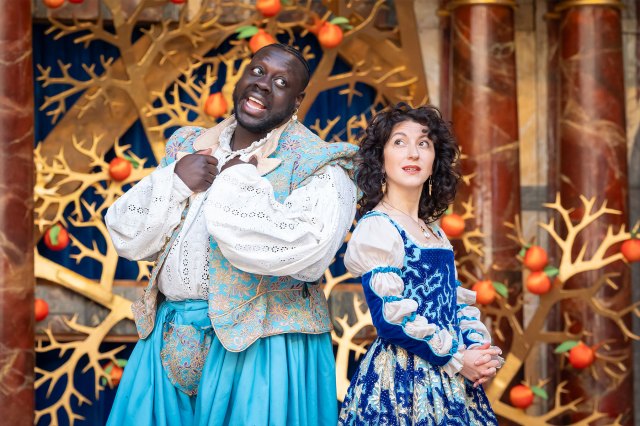Much Ado About Nothing at Shakespeare’s Globe review – an unqualified triumph
Sean Holmes’ staging runs until 24 August

Contemporary Shakespeare stagings these days tend to be so bound up with a directorial concept, transposing the plays to times or locations not specified in the text, that a production like this, comparatively unadorned and performed in historically accurate Elizabethan dress, feels like a bracing novelty. Not that director Sean Holmes treats Much Ado About Nothing like a fusty old museum piece: far from it, this version is dynamic and full of bawdy humour, vivid performances and acute psychological insights. It’s lively and lovely (and genuinely moving)…but gosh, it looks pretty.
It’s a mere two years since the Globe presented this sunniest and most heart-catching of the bard’s comedies, and that was quickly followed by a lavish National Theatre revival. However, where Lucy Bailey’s last Globe production (set in the 1940s just before the Allies liberated Italy at the end of WW2) had a lush, filmic quality, Holmes makes his Much Ado innately, earthily theatrical, involving the audience (especially those right by the stage) like extra characters in the play. That’s hardly a new concept at this venue but I’ve seldom seen it work as joyously well as it does here.
The casting of the initially reluctant lovers is integral to the success of any iteration and with this Beatrice and Benedick (Amalia Vitale and Ekow Quartey), Holmes’s production is an unqualified triumph. I’ve seldom, even at the Globe, heard an audience so vocally invested in the story and outcomes of a play, and that’s particularly true in the case of the two leads. Individually, Vitale and Quartey find fascinating quirks, contrasts and colours in these beloved characters but collectively they’re touched with magic.
She’s like a benign human firecracker, witty, powerful yet innately nice, a delightful show-off, and patently not about to accept the constraints placed on her by virtue of her sex. He’s goofily lovable, with a masterful ability to connect directly with the audience, but with an intriguing hint of melancholy, suggesting a man not always fully comfortable in his own skin despite his swagger amongst his colleagues, who only truly blossoms under the beam of Beatrice’s warm, fierce light: the line “I do love nothing in the world so well as you – is that not strange?”, delivered with a helpless inevitability, has seldom hit as hard and emotionally as it does here.
There’s a particularly telling section in the aftermath of the wedding humiliation of Lydia Fleming’s strong, honest Hero at the hands of deceived Claudio (Adam Wadsworth, shading painfully and impressively from delightful gaucheness to outraged distress). Vitale’s Beatrice is so upset by what’s just occurred she can barely speak, her words coming out in clotted, incoherent gulps, and the tenderness with which Quartey’s Benedick reaches out to comfort her feels so genuine, so absolutely right, you’re in no doubt she’s met her match. The emotional authenticity takes the breath away: this is beautiful, nuanced acting in a space that doesn’t always allow for that, and is a potent contrast to the barnstorming comedy on display elsewhere.
Those comedic elements are exceptionally well served as well, notably by Jonnie Broadbent’s fabulously fey Dogberry who’s superbly supported by Colm Gormley as hangdog Northern Irish Verges and Emma Ernest’s bone-dry, all-seeing Margaret. More than most productions I’ve encountered, Holmes’s makes their rampant high comedy seem all of a piece with the rest of the play.
This is a production that fills the Globe’s expansive but sometimes unfocused space with energy and generous spirits, and it’s an entirely satisfying, surprisingly surprising rendition of a comedy that gets done so often it runs the risk of over-familiarity. Don’t be surprised to be wiping tears, both of mirth and emotion, from your face. A Much Ado About Nothing that’s as fragrant, irresistible and good for you as the oranges that are impaled, crushed and torn apart in the course of the performance and which, piled up in baskets or hanging from trees, form an integral part of Grace Smart’s suitably Italianate set. Absolutely marvellous.

















